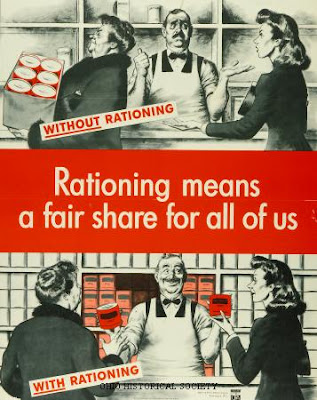 I think that we should bring back rationing. It might be a little draconian, but it would certainly help many people through the credit crunch, make sure that the rich and the poor get a similar level of nutrition, would stop the obesity problem Britain has and encourage people to be less wasteful with food again.
I think that we should bring back rationing. It might be a little draconian, but it would certainly help many people through the credit crunch, make sure that the rich and the poor get a similar level of nutrition, would stop the obesity problem Britain has and encourage people to be less wasteful with food again. The last time that we had rationing in Britain was when an Austrian with a Charlie Chaplin moustache was goose stepping through Europe, and the entirety of these islands started ploughing up their lawns and growing potatoes. People began tending livestock and their children’s bunny ended up in a stewpot, all so we could support the war effort and defeat the Nazi menace. And nearly seventy years later, we are faced with another menace – bankruptcy!
The credit crunch has seen people’s spending patterns change dramatically. Budget supermarkets like Lidl and Aldi see an increase in turnover and profit as people abandon Sainsbury’s for these other shop’s budget burgers and cheap chickens. The problem with this is that the reason that a lot of the products in such shops are cheap is because they are no bloody good. They are jam packed with all sorts of chemicals, water and fats and the welfare of the beasties being killed to be minced into Bratwurst will have been totally forgotten by the Hugh Fearnley-Whittingstall watching middle classes. And due to the fact that they abandoned their free range bird and are getting a chicken for less than three quid, people are being equally wasteful, the only difference is that they are now being cruel to the bird that was dispatched for their dinner as well.
My argument for rationing mainly centres upon it forcing people to be thrifty. Instead of buying a chicken (free range or tortured), roasting it and only eating the breasts before it gets chucked into the bin, we should be encouraged to use the leg meat for stews or sandwiches and the carcass for soup stock. Similarly, rather than three or four spuds in chips, a baked potato would suffice, resulting in healthier meals and using less food. This would result in a healthier nation and would also mean that people would be able to make two or three meals with the food they would normally use for just one.
Petrol too should be rationed. The result of this would be that the ozone layer would be mended, people would have more money in their pocket and there wouldn’t be as many young chavs driving their lowered Vauxhalls around town, frightening old ladies. If everybody was restricted to three gallons of fuel per week, people would question if the journey was really necessary, and if it was, they would drive more carefully and not speed. To maximise fuel economy, every driver would have to pay more attention to what they were doing and the speed they were driving. In doing so, the result could be fewer accidents and no unwanted speeding fines for drivers!
The key word is thrift – we need to rediscover it.
And that brings me to Grappa. If ever there is an alcoholic beverage that shows thrift, it is Grappa. Made from the skins, seeds and stalks of grapes used to make wine, it shows the practical uses of a waste product. The only problem with grappa is that I have found that it has the appeal of drinking turpentine.
Earlier this year at Vinitaly, I was fortunate enough to have my eyes opened a little to the fact that the grappa I had previously had must have been terrible. I was taken through several of these spirits, from different grape varieties, and I discovered that there was a difference between the multitude of paint thinners, sorry grappas. But I tried them after four days of tasting wine and my palate was shot, so my opinion of grappa being terrible could have been a touch unfair. When I was given the chance to try Poli grappa recently, I reckoned that I should look at them afresh.
The Sarpa di Poli Grappa was vegetal, with a bit of pear and quite minty on the nose, and then with a clean, graphite flavour and quite alcoholic. The Vespaiolo Grappa was pure paint thinner, some rotten pears and with a touch of lemon washing up liquid. Rough as hell on the palate too. They also produce a grappa from Tignanello pomace and it is musky with some petroleum and pepper and some twigs. Basically, they are all boring spirits, granted with differences, but boring nevertheless.
However, there was one that was almost tasty. The Moscato di Poli had aromas of Schweppes Lemonade and Earl Grey Tea. There was more tea on the palate, with some thyme and bitter orange. I quite liked this, but no more than I like Schweppes Lemonade, which is not a lot, and Earl Grey which is not at all.
Grappa reminds me of my local greengrocer. I want to buy my fruit there because the people are lovely and I’m supporting a small business, but they charge too much for over ripe, semi rotten fruit that tastes crap. I’d like to drink grappa, a lot of them are small businesses that are making something from nothing, but, like the greengrocer, they charge too much and their produce tastes crap.
Comments